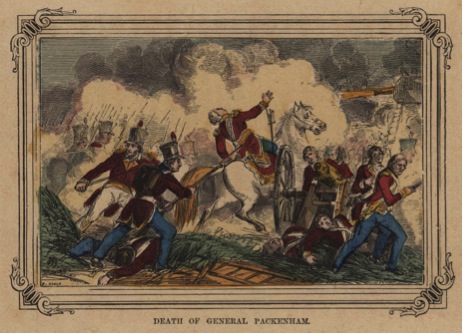
(Tennessee State Library Photography Collection)
It was more than 30 years ago that Thomas Francis Dermot Pakenham, 8th Earl of Longford — and descendant of Major General Edward Packenham of Battle of New Orleans fame — graciously welcomed our ragtag bunch of New Orleanians to his ancestral home, Tullynally Castle, in County Westmeath, Ireland.
Originally known as Packenham Hall, the house was Gothicized along the way and given its current name, Irish for Hill of Swans.
Tullynally lived up to its reputation for both eccentricity and erudition, from the soaring great hall with its impressive stone fireplace and family memorabilia to the suitably dark-paneled library, filled floor-to-ceiling with choice selections from the more than 6,000 books the house is said to contain. Both Pakenham himself, now 81, and his sisters, Antonia Fraser and Rachel Billington, are noted writers in Great Britain and Ireland; and Tom, as he’s known to friends, has turned to writing about plants in this century and has become a celebrated arborist.
My wife, Millie, and I had agreed to lead a tour of music festivals in England and Ireland; and after dinner and a concert at Desmond-Guinness-supported Castletown House outside Dublin, we headed to Tullynally for lunch the following day. It was to be our only non-music venue on the tour; the lure, of course, was its relationship to the Battle of New Orleans.
Following a brief and enthusiastic welcome, our new best friend Tom — after all, we both reside in historic homes, where we welcome guests to help pay the bills — led our group into the great hall and pointed out the antlers from a “prehistoric” moose that crowned the chimney breast.
Then we entered the heart of the house, the fabled library, where a splendid portrait of the Anglo-Irish General Pakenham hangs over the fireplace. This was the image we all had of the young military hero, brother-in-law of the Duke of Wellington, veteran of the Peninsular War that contributed to Napoleon’s ultimate defeat, who was cut down in Chalmette, fighting Andrew Jackson’s ragtag militia, at the tender age of 36.
But what drew everyone’s attention was the small musket ball mounted on a plinth that sat front-and-center on the mantelpiece: the projectile, Tom told us, that killed his illustrious ancestor, far away, just down the road from Rocky and Carlo’s restaurant.
Pakenham was packed into a cask of rum for his return to the United Kingdom and is buried in St. Paul’s Cathedral in London. The general was known for his surly temper, and a relative reputedly dismissed his alcohol-laced return with the quip, “The General has returned home in better spirits than he left.”
Soon it was time for lunch in the castle’s dining room, where it is rumored that the major general’s favorite horse is buried below the glistening mahogany table. Millie’s mother, Mildred Porteous Ball, a Helen-Hayes-style lady, was with us; and we insisted that she wait with Millie and me — the tour guides — until all the others in the group had served themselves from the buffet, crowned with what Tom described as a lovely mousse.
The others served, Mildred eagerly approached the mousse, scooped a healthy portion onto her plate — and a cloud crossed her usual cheerful visage.
No doubt recalling the prehistoric moose in the great hall, Mildred was upset; she told us in no uncertain terms that she was disappointed that there was no moose in her mousse— everyone else must have taken the meat, leaving only the thick, creamy sauce ….
After lunch, Millie and I sat with Tom in the charmingly-antiquated lemon-yellow original kitchen, settling the bill for our visit. We were swapping tales of hosting guests in our historic homes when his assistant rushed in and informed him in an agitated tone, “Mr. Pakenham, there’s a tour bus turning into the grounds.”
“It can’t be; there’s nothing scheduled,” he sighed, putting his head in his hands and softly weeping.
We understood completely.
Almost three decades later, the Battle of New Orleans entered my life again. I’d seen Houston’s Opera Vista company’s production of American composer Amy Beach’s opera, Cabildo, prepared by conductor Viswa Subbaraman, who now serves as artistic director of Milwaukee’s Skylight Music Theatre. I was determined to bring it to the courtyard of the actual Cabildo, where the action takes place.
In 2009, Music @ Madewood presented, at the Cabildo, this fanciful opera, with its Battle of New Orleans echoes, its reminiscing about Dominique You and Jean Lafitte’s brother Pierre, who are credited by many with supplying extra fighting men to assist Andrew Jackson.
That evening, as the opera ended, I thought of Tom Pakenham and our visit to Tullynally Castle, and wished I’d thought to serve mousse at the cast party.
 NOLAbeings Multimedia artist Claire Bangser created NOLAbeings as a portrait-based story project that marries...
NOLAbeings Multimedia artist Claire Bangser created NOLAbeings as a portrait-based story project that marries...  Voodoo in New Orleans: Reviving history: New Orleans fortune telling This article takes a deep dive into the history of Voodoo in New Orleans, its hybridization with Catholicism, and its present-day place in the city's culture. The author visits fortune-tellers in the French Quarter, using their guidance as a tool for introspection rather than a deterministic predictor of the future. Through her experiences in New Orleans, the author feels a mystical connection to both the past and the future.
Voodoo in New Orleans: Reviving history: New Orleans fortune telling This article takes a deep dive into the history of Voodoo in New Orleans, its hybridization with Catholicism, and its present-day place in the city's culture. The author visits fortune-tellers in the French Quarter, using their guidance as a tool for introspection rather than a deterministic predictor of the future. Through her experiences in New Orleans, the author feels a mystical connection to both the past and the future. 